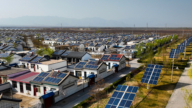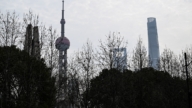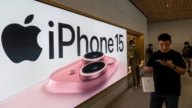【新唐人2013年06月28日訊】中國銀行的「錢荒」風波越演越烈,引起國際社會的關注。日前,諾貝爾獎得主,經濟學家蒙代爾(Robert Mundell)指出,中共應對「錢荒」的方式相當奇怪。下面我們來看看專家的分析。
週一,中國大陸「央行」說,希望銀行保持「穩定適當」的信貸增長。這對諾貝爾獎得主、經濟學家蒙代爾(Robert Mundell)來說,似乎是「央行」因為中國銀行多年來的大量放貸,而對銀行進行的「懲罰」。
日前,在香港接受美國《華爾街日報》採訪的蒙代爾說,收緊資金,更多的是宏觀經濟上的問題,而信貸緊縮會削弱經濟擴張,不利於增長。蒙代爾認為,流動性資金短缺會給中國經濟帶來威脅。
美國「南卡羅萊納大學」艾肯商學院教授謝田表示,中共一方面擔心經濟「硬著陸」,一方面又要收緊信貸,這是自相矛盾的。這就是為甚麼蒙代爾覺得奇怪的原因所在。
美國南卡羅萊納大學艾肯商學院教授謝田:「它(中共當局)也知道中國經濟泡沫、房地產的泡沫、實體經濟在基建投資上的浪費,還有很多錢進入金融界,在進行大量的投機。他們(央行)用的手段就是收緊銀根,這在美國經濟學家來看,他們如果不知道中共背後有這麼多不能夠見人的秘密,那麼多造假,他就會覺得非常奇怪。」
謝田指出,中國銀行的過度借貸,把大量金錢投入金融的投機和房地產上,沒有進入到對國計民生有效的實體經濟領域,再繼續下去的話,房地產泡沫會破滅,金融泡沫也會破滅。
當前,中國的「錢荒」同樣引起香港業內人士的關注。《香港經濟日報》日前的一篇評論文章指出,中共國務院總理李克強以「錢荒」為突破口,借勢整頓銀行,和深化金融改革。
文章指出,中國存在金融機構業務和資金的嚴重「錯配」,但是除了「錯配」嚴重外,更嚴重的是,近年銀行存在信貸質量下降、資金周轉率低的問題,這些都引起了李克強等決策層的注意。
評論還分析,影子銀行(地下錢莊)和各種理財產品一旦出現大面積危機,中國將出現金融系統性崩盤的風險,進而將經濟拖入深淵。
「國務院發展研究中心」的經濟學家李佐軍曾經指出,中共新一屆領導人將面臨兩種選擇,一種是把之前的經濟泡沫再接過去,再精心維護,最遲能維護到2015年、 或2016年,那時會是一個更大的危機。另外一種選擇是拒絕接受這個泡沫,讓這個泡沫破掉。雖然會帶來一段時間的痛苦,但是,對於新的領導人來說是好事, 因為責任很清楚,不是他們造成的。李克強選擇了後者。
謝田認為,李克強會不會以「錢荒」為突破口,藉機整頓銀行,或者是推進他所需要的金融改革,有幾種可能性。一是,下面的銀行不能聽從他的管轄了﹔另一個可能是,李克強不想繼承前任江澤民、胡錦濤時代中國經濟的巨額麻煩,想把這個巨大的包袱放下來,作一個了結,重新開始。
謝田:「第三個原因,中國的錢都通過共產黨官員,既得利益集團,多次轉手,現在都聚攏在這些高幹子弟和特權利益階層他們所控制的那些企業,他們可以拿這些錢出去,可以到海外去投資,(用)這些錢在影子銀行和金融圈子裡來炒作,這就會造成中國確實金融界流動性不足,不得不逼著中央銀行進一步放鬆銀根,甚至推出更大面額的鈔票,使中國的通貨膨脹一發不可收拾。」
謝田認為,目前中共擔心的是民眾去銀行提錢擠兌,因此,當局還是繼續往銀行砸錢來製造經濟泡沫。
採訪編輯/常春 後製/王明宇
Nobel Prize Winner: Strange Credit Crunch For China
The money shortage of Chinese banks is worse,
attracting the world’s attention.
Robert Mundell, Nobel Prize-winning economist said that the
Chinese Communist Party (CCP) is not really dealing with it.
Let’s take a look.
On June 24, China’s Central Bank said that they hope
banks maintain “stable and appropriate” credit growth.
However, Robert Mundell said that the Central Bank’s
years of lending has resulted in this punishment.
Recently, Mundell told the Wall Street Journal in an interview
in Hong Kong that tightness of money is more macroeconomics.
The credit crunch is going to cut down expansion and growth.
Mundell believes that the shortage of liquidity is starting
to create a threat to China’s economy.
Xie Tian, professor at Aiken Business School of the
University of South Carolina said that on one hand,
China worries about an economic hard landing;
on another hand, the CCP wants to cut down the funds,
both are contradictory.
This made Mundell feel things are a bit strange.
Xie Tian: “The CCP knows the economic bubble, real estate
bubble, and investing on infrastructure is wasteful.
A lot of money runs into the financial sector for speculation.
They (the Central Bank) deal with it by tightening the money.
For many US economists, if they don’t know there are so many
secrets and frauds behind the CCP, they will feel it strange.”
Xie Tian said China’s banks were wildly lending money that
was invested on financial sectors and properties, but not on real economy areas.
By continuing to do so, the property and
financial bubble will burst.
At present, China’s “money shortage” is also worrying
people in Hong Kong.
Hong Kong Economic Times published a commentary saying
that Premier Li Keqiang used “money shortage” to break point
to rectify banks and deepen financial reform.
The article said that businesses and financial institutions
in China have a serious “mismatch”.
More seriously, loan quality from banks has declined.
The problem of low liquidity drew the attention of
Li Keqiang and CCP decision-makers.
The article analyzed that “shadow banking” and other financial
processes could become a widespread crisis.
Then China’s financial system risks collapse,
and its economy will drop into the abyss.
Li Zuojun, economist in China’s Development Research Centre,
State Council, said the CCP new leadership faces two choices.
One is to carry on the current bubble economy and keep it
until 2015 or 2016 By then, a bigger crisis will occur.
Another one is to refuse the bubble and let it burst.
Although it will suffer the pain for a while it is a good
thing for new leadership.
It can make clear that they themselves didn’t cause the
bubble situation. Li Keqiang chose the later.
Xie Tian asks if Li Keqiang will use “money shortage” as a
means to rectify the banks, or implement financial reform.
Firstly, will banks listen to him? Secondly, Li likely doesn’t
want to accept huge economic troubles that Jiang Zemin and Hu Jintao left;
he wants to put down and settle these burdens.
He wants to start fresh.
Xie Tian: “Thirdly, China’s wealth has been transferred many
times from one official to another within the CCP interest groups.
Now it gathered in the companies controlled by princelings
and privilege groups.
They invest the money overseas to speculate within
shadow banks and financial sectors.
So it caused shortage of liquidity in the financial sector,
forcing the Central Bank to further ease monetary policy.
They will even issue larger bank notes, resulting in China’s
inflation getting out of control.”
Xie Tian said that now the CCP is worried the public will
withdraw money from banks.
So the authorities are continuously injecting money into
the banks, resulting in more economy bubbles.




























